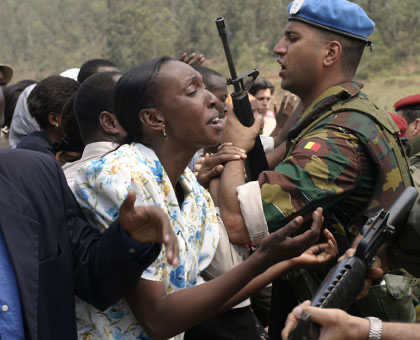“Belgium, after the killing of ten of its peacekeeping soldiers, was the first force behind the international abandonment of Rwanda at the height of the genocide.”
On April 21, 1994, as the genocide against the Tutsi intensified across Rwanda, the United Nations Security Council voted unanimously to reduce the number of UNAMIR peacekeeping troops from 2,548 to a mere 270. This decision came shortly after Belgium withdrew its contingent, setting the stage for the international community’s failure to prevent mass killings.
A report from the Belgian Senate’s Parliamentary Commission of Inquiry into the Events in Rwanda (1997) provides detailed evidence of Belgium’s aggressive diplomatic efforts to ensure the complete withdrawal of UNAMIR. The report reveals that Belgium actively lobbied members of the UN Security Council and troop-contributing nations to abandon Rwanda at a time when genocide was in full force.
Belgium’s campaign began on April 12, 1994, just days after the genocide started. Then-Foreign Minister Willy Claes instructed Belgian diplomats to persuade Security Council members and troop-contributing countries to support an immediate UN pullout. Belgian Ambassador to the UN, Paul Noterdaeme, took the lead, engaging in direct discussions with American, British, and French diplomats to push for a full withdrawal.
On April 13, Noterdaeme addressed a UNAMIR troop-contributors meeting in New York, emphasizing Belgium’s position. That same day, he reinforced the demand in a formal letter to the President of the Security Council and later met with then-UN Under-Secretary-General Kofi Annan to insist on a total withdrawal.
The Belgian report makes clear that its lobbying efforts deliberately excluded African nations, knowing they would likely oppose the withdrawal. Instead, Belgium focused on its Western allies, particularly the United States and the United Kingdom. Initially, both countries leaned toward a total pullout but later shifted to supporting a minimal UN presence for symbolic purposes.
Belgium justified its stance by arguing that Rwanda had become ungovernable, and UN peacekeepers were incapable of stopping the violence. The report cites Belgian officials who asserted, “There is no longer a government in Kigali, and there is no longer an effective ceasefire,” as grounds for withdrawal.
Despite the Belgian government’s push for withdrawal, Belgian soldiers stationed in Kigali did not want to leave. Many of them reportedly felt they were abandoning Rwandans to their fate and expressed frustration over the decision. However, their objections were overridden by the political leadership in Brussels, which remained determined to pull out all its forces.
During his audition before the Belgian Senate, in response to a commissioner’s question as to why Belgium had gone to such lengths to obtain the complete withdrawal of UNAMIR, Minister Claes, minister of Foreign Affairs at the time, stated that “the fear of losing face” had most certainly played a role, especially after Mr. Boutros-Ghali’s unfortunate letter in which he justified the withdrawal of UNAMIR by citing the Belgian Government’s decision to recall its contingent as the sole reason.
Public sentiment in Belgium was divided. While the government pushed for withdrawal, an opinion survey at the time revealed that 40 percent of those interviewed believed that “what is currently at stake in Rwanda might justify the risk of new military losses in terms of human lives, while 48 percent were in favor of maintaining the mission and even sending more Belgian soldiers in order to help restore peace.”
Belgium’s successful campaign for UNAMIR’s withdrawal directly contributed to the UN’s failure to intervene as the genocide escalated. The UN’s inaction resulted in the deaths of over one million Tutsi. While Belgium defended its position as a matter of security, critics argue that it was an abdication of moral and political responsibility, leaving Rwanda to face one of the darkest moments in human history alone.
The newly highlighted details from the Belgian Senate report add to ongoing debates about Belgium’s role in Rwanda’s tragic past. As history is examined in the current political climate, these revelations serve as a reminder of how diplomatic maneuvering can shape the course of events with devastating consequences.




















